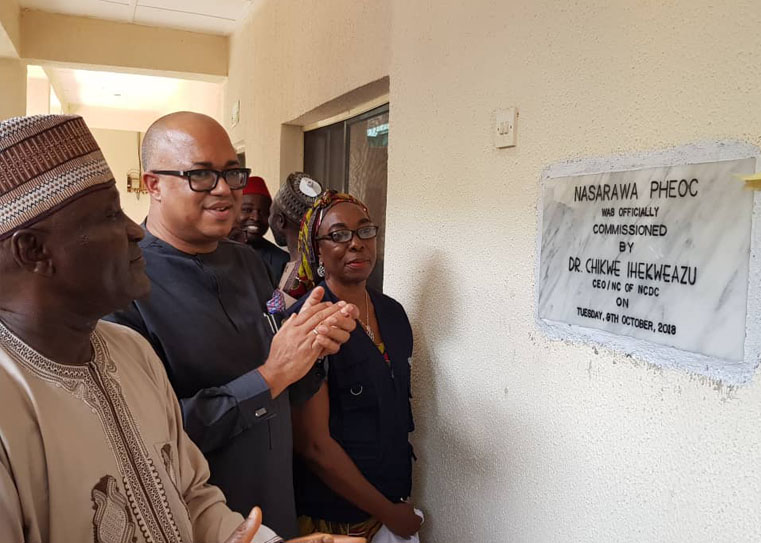
The Community-Based One Health Participatory and Empowerment (COPE) Strategy aims to enable communities to identify their pressing One Health challenges as well as sustainable local solutions for mitigation and adaptation. The strategy will be piloted using a mixed-method implementation science approach that employs a quasi-experimental convergent study design in two rural communities in Ebonyi State, Nigeria. The project implementation is through a community-based, participatory approach in a heavily burdened Lassa fever community with technical support provided by the One Health project team, which brings together anthropological, medical, veterinary, and environmental expertise from NCDC, RKI, NVRI, FLI and the University of Ibadan. The approach is based on a systematic collection of epidemiological, animal, environmental, and anthropological data to estimate baseline and post-COPE intervention burden of Lassa fever in the intervention community compared to the control community. The latter will receive the conventional risk communication intervention. This is meant to identify significant changes and the effects on One Health Challenges attributable to the COPE strategy– empowering the community from within and supporting community ownership of public health actions. The COPE strategy project is led by the community with support from the One Health expert project team, and is built on seven (7) elements namely:
Documentation of findings and domiciliation of the strategy.

To support the national response to the threats of Hepatitis (HEV), antimicrobial resistance (AMR) and nosocomial infections, the NCDC, through the 'Turn Nigeria Orange Campaign', has begun an international project with the Robert Koch Institute (RKI). The goal of the NiCADE project is to develop the capacity to prevent and manage disease outbreaks, with a focus on bacterial and viral diseases. Three grants have been approved by the German Ministry: on AMR, infection prevention control (IPC) and HEV surveillance. At the end of the two-year project period beginning April 2019, it is envisioned that NCDC will develop:

Through technical and financial support, the IANPHI project in Nigeria is focused on strengthening various capacity areas within Nigeria's NPHI.
The project aims to:

The Alliance for Epidemic Preparedness and Response (A4EPR) is an innovative platform for private sector engagement, by the Private Sector Health Alliance of Nigeria (PHN) and NCDC.
The A4EPR seeks to collaborate with the private sector to:
The priority areas of focus include:
IMPLEMENTING PARTNER

Public Health England (PHE) through an Official Development Assistance (ODA) funding, is supporting the establishment of strong national public health systems in low and middle income countries to ensure timely and effective prevention, detection, response and control of public health threats.
Through this project, PHE is working with NCDC to build a resilient and responsive public health system in Nigeria, underpinned by evidence-based strategy, policy, effective systems and a skilled workforce. Outcomes will be measured through improvements in IHR compliance measures and other process indicators based on the results of the Joint External Evaluation.
The project areas include strengthening emergency preparedness, resilience and response, enhancing national surveillance systems and public health laboratory networks.
IMPLEMENTING PARTNER

The Nigeria Centre for Disease Control is supporting States in the establishment of Public Health Emergency Operations Centre (PHEOCs). The project includes a training of state staff on incident management capacities and its utilisation. The State PHEOC will use incident management system to improve coordination of emergency response to public health events, reduce harm and saves lives.
The overall goal is to establish a functional PHEOC in all the states in Nigeria that will serve as an epidemic intelligent hub for effective communication and efficient resource management during any incident.
As at the 12 October 2019, PHEOCs have been established in Zamfara, Cross-River, Enugu, Ebonyi, Bayelsa, Lagos, Ondo, Edo, Nasarawa, Kogi, FCT, Kebbi, Plateau, Rivers, Anambra, Niger, Benue, Osun, Kwara and Abia states.

The MAURICE project is focused on developing a training manual, and implementing training activities to improve infection prevention and control (IPC) among healthcare workers in Nigeria.
The basis for the national IPC manual will be a thorough review of strategies, policies, scientific literature and best practices implemented by other public health institutions.
The overall goal of the project is to improve patient and health care workers' safety during outbreaks of epidemic-prone diseases.

In response to the 2014-2015 West African Ebola crisis, the World Bank established the Regional Disease Surveillance Systems Enhancement (REDISSE) project to cover all countries in the ECOWAS sub-region, including Nigeria.
The project aims to strengthen disease surveillance and response systems at regional level and in ECOWAS Member States and Mauritania. A credit of USD 90 million has been approved for implementation of the project in the Federal Republic of Nigeria.
The project was declared effective in Nigeria on the 13th of February, 2018 and has five (05) components:
 Toll Free Number: 6232
Toll Free Number: 6232 Whatsapp: +234 708 711 0839
Whatsapp: +234 708 711 0839 SMS Number: +234 809 955 5577
SMS Number: +234 809 955 5577